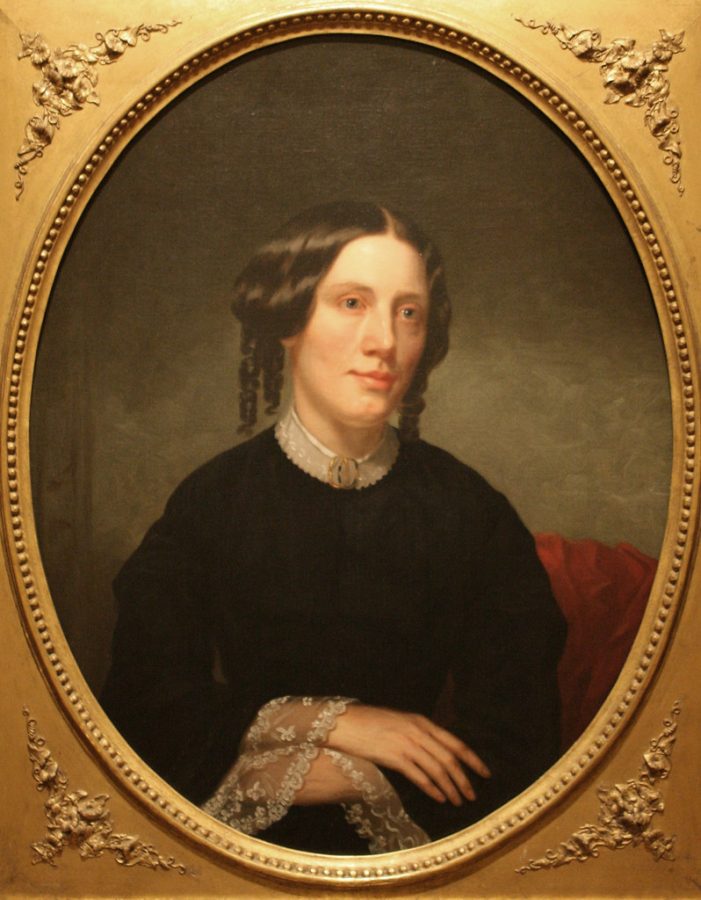Women who paved the way: Harriet Beecher Stowe
Courtesy of dbking on Creative Commons
Harriet Beecher Stowe is known for her famous novel “Uncle Tom’s Cabin.”
In light of Women’s History Month, The Hawks’ Herald is featuring important women from throughout history. The fourth week of March highlights women who have paved the way in literature.
Harriet Beecher Stowe was born on June 14, 1811 in Connecticut. She had a dozen siblings and most of them were involved in the abolitionist movement. Her sister Catherine founded the Hartford Female Seminary in 1823. Harriet attended this school, which was one of the only institutions that educated women at the time.
She later taught at the school from 1829 to 1832, before teaching at the Western Female Institute in Ohio, where she began her writing career. She wrote many short stories and co-authored a textbook.
She was invited to join the Semi-colon Club which was a literary organization that allowed her to sharpen her writing skills as well as giving her the opportunity to connect with influential members of the literary community as well as publishers. This is where she met her husband, Calvin Ellis Stowe, they married in 1836.
Her husband supported her writing endeavors and in 1846 she published “Mayflower: Or, Sketches of Scenes and Characters Among the Descendants of the Pilgrims.” The Stowe’s and their six children moved to Main after Calvin got a job teaching at Bowdoin College in 1850. A year later, their 18-month-old son passed away which was a driving force in Harriet understanding the pain mothers felt when their children were taken away from them and sold.
She had seen the horrors of slavery when living in Ohio as slavery was legal in Kentucky and there were many runaway slaves. These feelings along with the newly passed Fugitive Slave Act led Stowe to write “Uncle Tom’s Cabin.”
The story follows Tom, an honorable and selfless slave who was taken away from his wife and children to be sold into slavery. He saves the life of a white girl, this girl’s father, a Wealthy man, buys Tom and him and the girl become close friends.
The story also follows an enslaved person named Eliza whose son will soon be sold so she escapes with him but they are hunted down. Tom dies after being beaten to death for not revealing the location of escaped enslaved people. Stowe’s Christian beliefs were prominent in the novel.
She believed Christianity and slavery were at odds and that slavery was a sin. The novel was released in two volumes, one in 1851 and one in 1852. Within the first week, 10,000 books were sold and by the end of the first year, 300,000 copies were sold in the United States and another million copies were sold in Britain.
Stowe went on tour around the United States to promote the book and her abolitionist views but she was often unable to speak about the book in public. It was seen as unbecoming of a woman to speak to a large group of men so her husband or one of her brothers would speak on her behalf.
“Uncle Tom’s Cabin” was the first time many people understood the experiences that enslaved people were subjected to. In the North, the book made the abolitionist groups become bigger, louder and more powerful. In the South, the book sparked outrage as slave owners felt misrepresented and remained staunch advocates of slavery.
In some parts of the South, the book was illegal. It also served as a driving force for the division of the North and the South and it is believed that the book helped Abraham Lincoln get elected.
Stowe wrote many pieces during her career and spent much of her efforts into abolishing slavery. She donated parts of the money she earned from her book and tours to antislavery causes. Calvin retired in 1864 and the family moved to Hartford, Connecticut but would spend their winters in Florida.
In Florida, Harriet and her son, Frederick, created a plantation and hired formerly enslaved people to work on it. Harriet Beecher Stowe passed away on July 2, 1896.
Emily Dvareckas graduated from RWU in 2022 with a degree in forensic science. She spent three years with The Hawks’ Herald as the photo editor...






